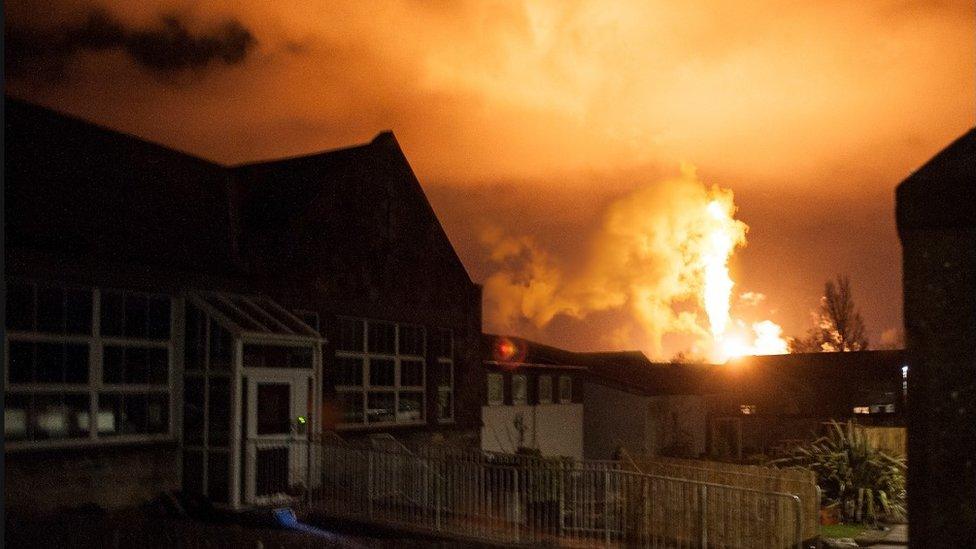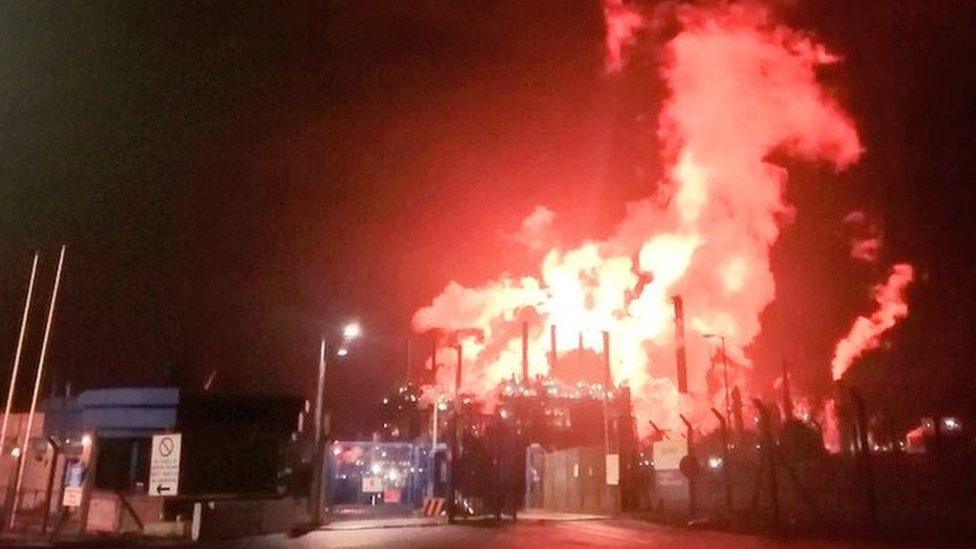Environmental watchdog concern over petrochemical sites
- Published

A plant restart at Mossmorran caused a flaring on Thursday evening
Environmental compliance at Scotland's industrial sites has dipped slightly for the first time in three years.
The Scottish Environment Protection Agency (Sepa), external said 90.5% of regulated sites were deemed "satisfactory" in 2018, a fall of 0.5%.
The food and drink sector has performed well, but there are continued concerns over the petrochemical operations at Grangemouth and Mossmorran.
A restart caused a huge unplanned flaring at Mossmorran last week.
Ineos Forties Pipeline, which operates the Kinneil Terminal at Grangemouth, was rated "very poor".'
The facility has been non-compliant since 2014 because of flaring from its towers and excessive discharges of effluent.
Sepa issued a final warning notice to the operator in 2018, but it says investment in new ground flares and an effluent treatment plant are expected to produce improvements.
Ineos said it had been making significant investments in the site and was fully committed to delivering a record of responsible environmental performance.
The Compliance Assessment Scheme assesses whether sites are meeting the conditions of their environmental permits.
The licenses determine the control measures which are necessary in industrial processes to minimise the risk of pollution or environmental damage.
All of Scotland's nuclear sites are rated "excellent", but ExxonMobil at Mossmorran in Fife is "poor".
A record number of complaints have been received by Sepa from residents living close to the plant.

Sepa has rated the Mossmorran site in Fife as "poor" for its environmental compliance
Repeated flaring incidents have caused significant light and noise pollution which many say is affecting their quality of life.
ExxonMobil has appealed the "poor" rating it has received and has asked Sepa for the "evidential data on which it has made its assessment".
An adjacent facility operated by Shell has improved to "excellent" from "good".
Chief executive of Sepa, Terry A'Hearn, said: "Whilst recognising successes, we're also clear on our strategy to tackle consistent non-compliance.
"We've already refocused resource on tackling poor performance at complex industrial sites and will this year start to see the first in a series of significant investments by operators that aim to improve environmental outcomes for communities.
"That combined with a newly established dedicated enforcement unit will focus of the most serious non-compliance."
Environmental compliance in the fish farming sector has improved after a period of intense scrutiny from MSPs.
The number of sites rated excellent, good or broadly compliant jumped from 82% to 85.6%.
Aircraft de-icing
Four of Scotland's airports - Edinburgh, Aberdeen, Inverness and Wick - have been classed as poor or very poor because they breached discharge limits.
At Edinburgh Airport, an enforcement notice was issued to ensure steps were taken to limit the release of de-icer used on aircraft.
The airport said it has made investments to reduce the amount of de-icer entering waterways.
The whisky, distilling and brewing sector is the best performing with compliance increasing from 93.2% to 95.5%.
One of the most high performing firms, being held up as an exemplar, is Tennent Caledonian which has been rated 'excellent' for three years running.
Martin Doogan, from C&C Group, which owns the Tennent's brand, said the company was "really, really proud" of its record on environmental performance.